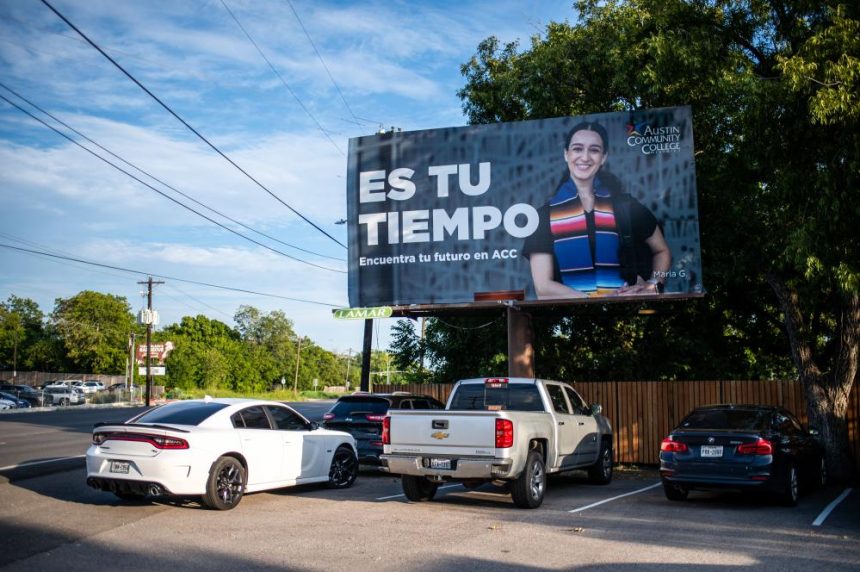Ximena had a plan.
The 18-year-old from Houston was going to start college in the fall at the University of Texas at Tyler, where she had been awarded $10,000 a year in scholarships. That, she hoped, would set her up for her dream: a PhD in chemistry, followed by a career as a professor or researcher.
“And then the change to in-state tuition happened, and that’s when I knew for sure that I had to pivot,” said Ximena, who is from Mexico but has attended schools in the US since kindergarten. (The Guardian and its partner the Hechinger Report, which produced this story, is using her first name only because she fears retaliation for her immigration status.)
In June, the Texas attorney general’s office and the Trump administration worked together to end the provisions in a state law that had offered thousands of undocumented students like Ximena lower in-state tuition rates at Texas public colleges. State and federal officials successfully argued in court that the longstanding policy discriminated against out-of-state US citizens who paid a higher rate. That rationale has now been replicated in similar lawsuits against Kentucky, Oklahoma and Minnesota – part of a broader offensive against immigrants’ access to public education.
At UT Tyler, in-state tuition and fees for the upcoming academic year total $9,736, compared to more than $25,000 for out-of-state students. Ximena and her family couldn’t afford the higher tuition bill, so she withdrew. Instead, she enrolled at Houston Community College, where out-of-state costs are $227 per semester hour, nearly three times the in-district rate. The school offers only basic college-level chemistry classes, so to set herself up for a doctorate or original research, Ximena will still need to find a way to pay for a four-year university down the line.
Her predicament is exactly what state lawmakers from both political parties had hoped to avoid when they passed the Texas Dream Act, 2001 legislation that not only opened doors to higher education for undocumented students but was also meant to bolster Texas’s economy and its workforce in the long term. With that law, Texas became the first of more than two dozen states to implement in-state tuition for undocumented students, and for nearly 24 years, the landmark policy remained intact.
Conservative lawmakers repeatedly proposed to repeal it, but despite years of single-party control in the state legislature, not enough Republicans embraced repeal even as recently as this spring, days before the Texas attorney general’s office and the federal Department of Justice moved to end it.
Now, as the fall semester approaches, immigrant students are weighing whether to disenroll from their courses or await clarity on how the consent agreement entered into by the state and justice department affects them.
Immigration advocates are worried that Texas colleges and universities are boxing out potential attendees who are lawfully present and still qualify for in-state tuition despite the court ruling – including recipients of the Deferred Action for Childhood Arrivals (Daca) program, asylum applicants and temporary protected status holders – because university personnel lack immigration expertise and haven’t been given clear guidelines on exactly who needs to pay the higher tuition rate.
At Austin Community College (ACC), members of the board of trustees are unsure how to accurately implement the ruling. As they await answers, they have so far decided against sending letters asking their students for sensitive information in order to determine tuition rates.
“This confusion will inevitably harm students because what we find is that in the absence of information and in the presence of fear and anxiety, students will opt to not continue higher education,” said Manuel Gonzalez, vice-chair of the ACC board of trustees.
Policy experts, meanwhile, warn that Texas’s workforce could suffer as talented young people, many of whom have spent their entire education in the state’s public school system, will no longer be able to afford the associate’s and bachelor’s degrees that would allow them to pursue careers that would help propel their local economies. Under the Texas Dream Act, beneficiaries were required to commit to applying for lawful permanent residence as soon as possible, giving them the opportunity to hold down jobs related to their degrees. Even without legal immigration status, it’s likely they will still work – just in lower-paying, under-the-radar jobs.
“It’s so short-sighted in terms of the welfare of the state of Texas,” said Barbara Hines, a former law school professor who helped legislators craft the Texas Dream Act.
The legislation was first introduced in the state’s lower chamber by retired army national guard Maj Gen Rick Noriega, a Democrat who served in the Texas legislature from 1999 to 2009, after he learned of a young yard worker in his district who wanted to enroll at the local community college for aviation mechanics but could not afford out-of-state tuition.
Noriega called the school chancellor’s office, which was able to provide funding for the student to attend. But that experience led him to wonder: how many more kids in his district were running up against the same barriers to higher education?
So he worked with a sociologist to poll students at local high schools about the problem, which turned out to be widespread. And Noriega’s district wasn’t an outlier. In a state that has long had one of the nation’s largest unauthorized immigrant populations, politicians across the partisan divide knew affected constituents, friends or family members and wanted to help. Once Noriega decided to propose legislation, a Republican, Fred Hill, asked to serve as a joint author on the bill.
The legislation easily passed the Texas house, which was Democratic-controlled at the time, but the Republican-led senate was less accommodating.
“I couldn’t even get a hearing,” said Leticia Van de Putte, the then state senator who sponsored the legislation in her chamber.
To persuade her Republican colleagues, she added several restrictions, including requiring undocumented students to live in Texas for three years before finishing high school or receiving a GED. (Three years was estimated as the average time it would take a family to pay enough in state taxes to make up the difference between in-state and out-of-state tuition.) She also included the clause mandating that undocumented students who accessed in-state tuition sign an affidavit pledging to pursue green cards as soon as they were able.
Van de Putte turned to Texas business groups to hammer home the economic case for the bill. And she convinced the business community to pay for buses to bring Latino evangelical conservative pastors from Dallas, San Antonio, Houston and other areas to Austin, so they could knock on doors in support of the legislation and pray with Republican senators and their staff.
After that, the Texas Dream Act overwhelmingly passed the state senate in May 2001, and the then governor, Rick Perry, a Republican, signed it into law the following month.
Yet by 2012, a new slew of rightwing politicians was elected to office, many philosophically opposed to the law – and loud about it. Perry’s defense of the policy came back to haunt him during the 2012 Republican presidential primary, when his campaign was dogged by criticism after he told opponents of tuition equity during a debate: “I don’t think you have a heart.”
Still, none of the many bills introduced over the years to repeal the Texas Dream Act were successful. And even the current Texas governor, Greg Abbott, a Republican border hawk, at times equivocated on the policy, with his spokesperson saying in 2013 that Abbott believed “the objective” of in-state tuition regardless of immigration status was “noble”.
By 2017, the same year Trump began his first term, polling showed a plurality of Texans in support of in-state tuition for undocumented students. More recently, research has indicated time and time again that Americans support a pathway to legal status for undocumented residents brought to the US as children.
But arguments against in-state tuition regardless of immigration status also grew in popularity: critics contended that the policy is unfair to US citizens from other states who have to pay higher rates, or that undocumented students are taking spots at competitive schools that could be filled by documented Americans.
The justice department leaned on similar rhetoric in the lawsuit that killed tuition equity in Texas, saying the state law is superseded by 1996 federal legislation banning undocumented immigrants from getting in-state tuition – over US citizens – based on residency.
In Texas, the sudden policy change is causing chaos. Even the state’s two largest universities, Texas A&M and the University of Texas, are using different guidelines to decide which students must pay out-of-state rates.
“Universities, I think, are the ones that are put in this really difficult position,” said Luis Figueroa, senior director of legislative affairs at the advocacy group Every Texan. “They are not immigration experts. They’ve received very little guidance about how to interpret the consent decree.”
Meanwhile, young scholars are facing difficult choices. One student, who asked to remain anonymous because of her undocumented immigration status, wondered about her future.
The young woman, who has lived in San Antonio since she was nine months old, had enrolled in six courses for the fall at Texas A&M-San Antonio and wasn’t sure whether to drop them. It would be her final semester before earning her psychology and sociology degrees, but she couldn’t fathom paying for out-of-state tuition.
“I’m in the unknown,” she said, like “many students in this moment.”
-
This story was originally produced by the Hechinger Report, a non-profit, independent news organization focused on inequality and innovation in education








